Mask mandates are making a comeback in hospitals, but are they really needed?
More than nine million Americans now live in an area where mask mandates have returned to local hospitals — amid concerns that more health facilities could rescind the measures.
At least seven hospital systems recently rolled back mask policies in the New York, California and New Jersey areas.
Most recently, on Monday, New Jersey’s largest hospital system — RWJBarnabas Health — became the latest to bring back measures for patients, visitors and staff, along with social distancing, citing concerns about rising COVID-19 cases.
But data from the Centers for Disease Control and Prevention (CDC) currently shows that hospitalizations and cases are declining nationwide.
Several schools have also brought back face masks in classrooms and earlier this year one in Kentucky switched to remote learning due to a surge of sick children.
Studies have not been able to definitively show that masks prevent Covid infections — despite millions of Americans being forced to adhere to the mandates. But experts still say it is advisable to wear them in hospitals, as staff often come to work sick.
Despite shifts in some hospital systems, there is little indication that mandates will return nationwide, with Dr. Anthony Fauci — the former White House Chief Medical Officer — all but ruling this out last month.
On Monday, New Jersey’s largest hospital system – RWJBarnabas Health – (one of the hospitals pictured above) became the latest to bring back mask mandates along with social distancing, citing concerns about rising cases (photo above)
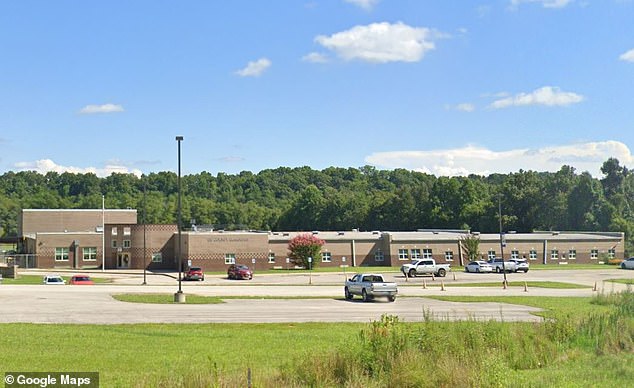
Above is Lee County Elementary School in Beattyville, Kentucky. At the end of August, the school switched back to distance learning because so many children were sick with Covid. It has now returned to the classrooms
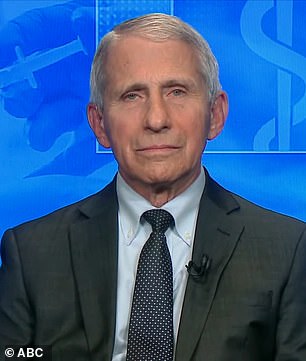
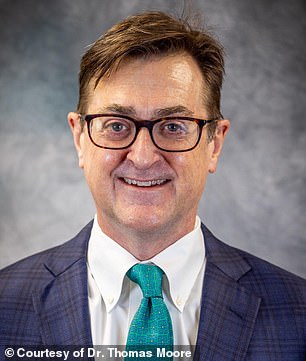
Dr. Anthony Fauci (left) said he would be “extremely surprised” if the US reinstates nationwide mask mandates in crowded areas. Dr. Thomas Moore (right), an infectious disease expert at the University of Kansas, said masks worked as long as they were worn properly
The new mandates in the RWJBarnabas health care system, which serves New Jersey residents in all parts of the state, will impact the network’s 12 hospitals – which see nearly three million patients per year and are staffed by 37,000 clinicians.
A spokesperson for the network said: ‘This decision has been made due to an increase in Covid prevalence in these communities.
“The health and safety of our team members and patients is and will always be our first priority.”
RWJ Barnabas is the largest of New Jersey’s 12 health care systems and made the decision days after Hackensack Meridian Health, also in the state, said it would bring back face masks.
Official data shows that Covid hospitalizations in the state are currently on a downward trend, with 521 patients currently hospitalized, compared to 572 seven days earlier.
The numbers remain well below the state’s 2023 peak of nearly 1,800 Covid patients in January.
Champlain Valley Physician’s Hospital, in Plattsburgh, New York, also recently returned to masking afterward 50 of the employees were sick due to Covid and the number of hospital admissions for Covid patients increased.
Other health care facilities that have reimposed mask mandates include Kaiser Permanente facilities in Santa Rosa, California, which serves a county of 500,000 residents. She resumed her policy at the end of August.
And two hospitals in Syracuse, New York, returned mask mandates for their units on August 17 in response to rising case numbers.
While facilities may reinstate masking in hopes of curbing local spread of the virus, doctors have warned that in order to work, masks must be worn properly and cover the nose and mouth.
But even then, some research suggests that wearing face coverings does not prevent infections – while they can harm communication and education, especially in children.
One of the most comprehensive meta-analyses of face coverings conducted to date, published in February 2023, found that masks made ‘little to no difference’ to Covid infection and death rates.
Conducted by the Cochrane Institute, the ‘gold standard’ of evidence-based assessments, researchers found they reduced the risk of contracting a ‘Covid or flu-like illness’ by just five per cent – a figure so low it may not be statistically significant.
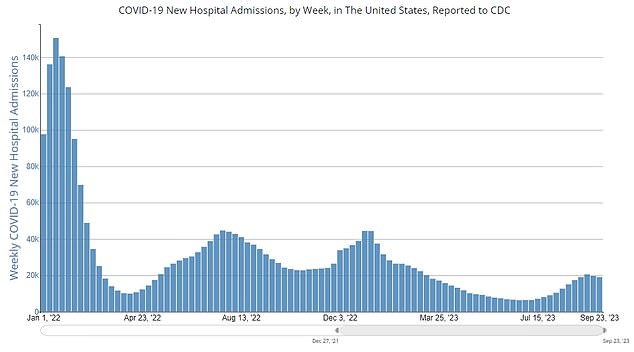
The above graph shows the number of Covid hospitalizations per week in the US
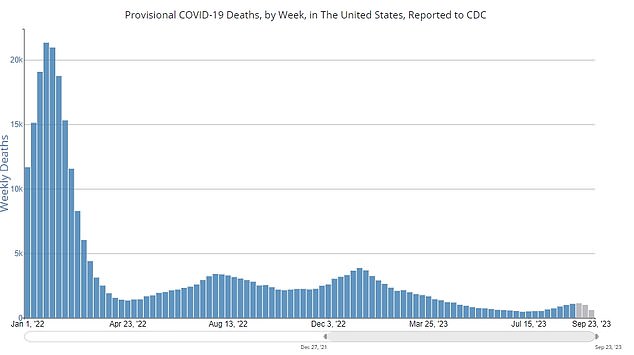
Covid deaths are still rising, but this is a lagging indicator due to the amount of time it takes to record a Covid fatality
The researchers said the harm caused by masks – including hindering children’s education – was poorly measured in the studies, meaning any small benefit in infection rates may be offset.
The meta-analysis was based on 78 global studies involving more than one million people.
But earlier this year, experts at the National Institutes of Health (NIH) urged continued use of masks in healthcare settings to protect patients.
They said the request was because medical workers are notorious for working while sick and asymptomatic individuals can still transmit viruses.
Dr. Thomas Moore, an infectious disease expert at the University of Kansas, told DailyMail.com that there is evidence that masks help prevent infections as long as they are worn and kept on properly.
He said most masks worked well at preventing Covid infections by trapping virus droplets in their material, but the hospital-grade N95 mask was the best at preventing infections.
These latest mandates come after Dr. Fauci said last month that nationwide face mask mandates would not return this winter even if Covid cases rose significantly.
The former White House chief medical adviser said he would be “extremely surprised” if they were reinstated.
But he couldn’t promise that masks would no longer be “recommended.”
When asked if mask mandates would return on ABC’s “This Week,” Dr. Fauci said, “No, I don’t see that in the future at all.”
‘I would imagine that if we see a significant increase in cases, you may see the recommendation to use masks in certain circumstances and in crowded environments.
“But I don’t see any federal mandates coming, certainly not. I would be very surprised if we did see that.”
Last month’s Covid wave – which caused alarm – already appears to be subsiding.
Official data showed there were 19,079 Covid hospital admissions nationally in the week ending September 23, a three per cent drop on the previous week.
The number was also well below this year’s peak of 44,400 admissions in January.
The positivity rate – the proportion of Covid tests that detect the virus – has also fallen by one per cent in a week, falling to 11.6 per cent in the week ending September 23.
Fatalities also fell to 607 in the same week, compared to 1,005 the week before.
